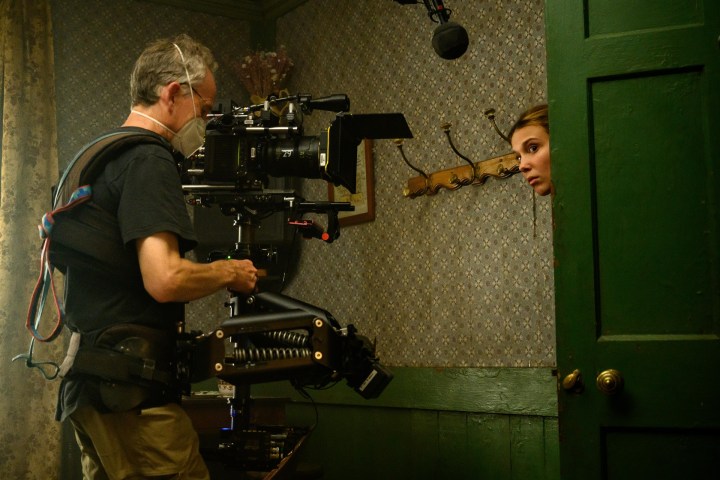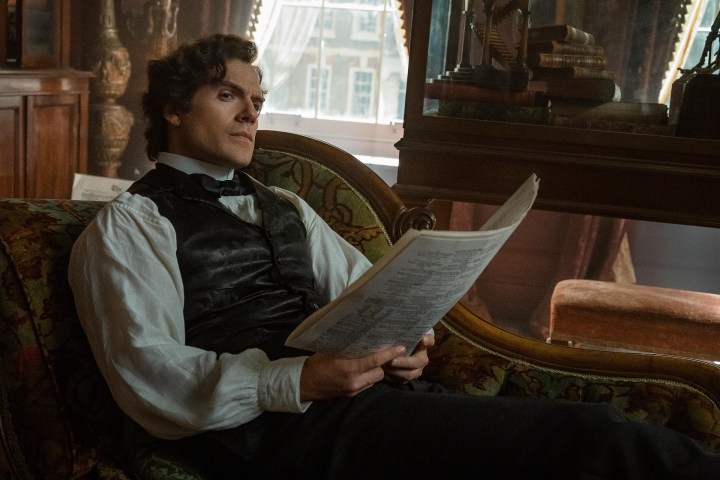After the 2020 Netflix film Enola Holmes became a surprise hit, introducing Stranger Things actress Millie Bobby Brown as Sherlock Holmes’ brilliant sister, the only mystery left unsolved was when we’d get a sequel. That question was answered with the November 4 premiere of Enola Holmes 2, which delivers another exciting, fascinating, and funny chapter in Enola’s saga, complete with plenty of clever twists.
Along with Brown returning as the title character, Enola Holmes 2 also brings back Henry Cavill (The Witcher) as Sherlock, as well as director Harry Bradbeer (Fleabag) behind the camera, among others. Digital Trends spoke to Bradbeer about his work on Enola Holmes 2 and whether a third installment of the franchise could be in the works.

Digital Trends: The first film focused on Enola learning to be independent and getting things done on her own, without help from her famous brothers. This one pivots from there quite a bit thematically. How would you describe the film’s themes this time around?
Harry Bradbeer: Well, you put your finger on it. In a sentence, it’s going from “I” to “we” — from learning to be able to stand on your own two feet to learning the power of working with others and of cooperation. [It’s about] learning you have to unite to be able to find your full strength as a human being.
We developed that idea into her relationship with Sherlock, into enlisting Tewkesbury’s (Louis Partridge) help, and of course, the major story that runs through it all: Her joining together with a group of working-class girls to fight corruption and further the cause of union and sisterhood.
How did Millie Bobby Brown’s portrayal of Enola evolve over time? Was there a point where the role leaned heavier into comedy or drama or such and it took some refining to get to what we see in the films? She embodies the character so well.
Having worked in TV, you know from your first series what you’ve learned and what you want to take forward. And so we saw what we had in the first film: this incredible actor that could teeter between the comedy and the drama and the tragedy. That balance is my stock-in-trade. It’s what I love to do, because I think that’s what life is. Billy Wilder said comedy and tragedy is life, and that’s exactly it.
So we were working with that, but we were listening to the way she worked and what she was bringing forward, and we realized very early on that this was a girl who was growing up in a hurry. We wanted to bring a bit of that in and grow up with her over that film, which was shot two years [after the first film] when she’s almost at her 18th birthday.
So we worked with what Millie had and what she was excited to do more of. We knew we wanted to do more with Sherlock. We knew the audience was desperate to see her and him solving a crime together. And of course, they wanted to see Enola and Tewkesbury develop their romance. So that was the progression.

Both films have a wonderful way of working with the audience to add a bit more emotion to moments when Enola gives the camera a look for just a second that conveys how she’s feeling. How did you get the tone right for those moments when she breaks the fourth wall?
That’s very kind of you to say. We experiment with it. Often, I would give a free take at the end of a scene, and in that case, [Brown] may throw a look in or not. We ration it, too. There are times when there is no time for levity. It’s too serious for her to give a look to the camera, or she’s doing things she’s slightly embarrassed about — like when she’s dancing with Tewkesbury.
He’s teaching her to dance and she’s falling in love with him, and she catches us there and she’s like, “No. Go away.” At that point, she’s saying, “Don’t look at me. Leave me alone. This is awkward.”
So it can be expressing awkwardness. It can be expressing complicity. It can be a wink. Or when she says, “Perhaps I should write that down,” after Sherlock gives her a piece of rather shocking advice, what else is there to say?
Henry Cavill’s Sherlock gets quite a bit more development in the sequel. What is it that Henry brings to the role that helps make it unique and special to this franchise?
I think he’s got a real emotional connection to the character. He understands Sherlock’s loneliness, which is not just because Sherlock lives alone and his family is dysfunctional, but also because his brain works at such a rate that it’s hard for him to relate and do small talk and get on with people. That’s why sometimes he has to release his tensions and his worries by going to the bar and having a drink and getting into a fight. That’s the way he can relax.
His emotional difficulties are something Henry related to, connected with, and felt he could bring forward. And as a member of a very close family, [Cavill] also understands how brotherhood works. I felt right from the first time we met that he would bring something warm and interesting to the relationship with Enola.

Without revealing any spoilers, is there an element of the film you’re particularly proud of?
The thing I really loved was the message of the film: The importance of listening to and working with others, [and] the idea of cooperation, which is something very close to my heart as a collaborative person in art and in life. I think we can be too caught up in our own egos and lost in our own smartphones, and we need to connect. It’s that element of the film — the idea of union, of setting aside our ego for the moment and our pride and being open to connection with others — that ultimately leads in the films to its actual triumph.
The final climax requires that cooperation [and] the setting aside of ego for the common good. That message, inside a piece of entertainment, was always my ambition. I’m proud that I think it works. I think we managed to pull that off.
The film sets up another installment really well. Has there been discussion of where things will go in future films or how many films it would ideally take to complete Enola’s story?
Well, we only go one film at a time, like we did with the first. But of course, we’ve talked about the future possibilities and the directions they could go in. I’m glad you can see that possibility on the horizon.
Directed by Harry Bradbeer, Enola Holmes 2 is available now on Netflix.





